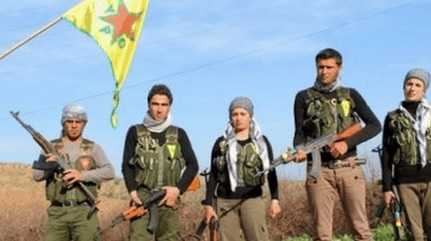
15 May 2022; MEMO: The United States has exempted territories in Syria run by the Kurdish militia the People's Protection Units (YPG) from wide-ranging sanctions, in a decision which neighbouring Turkey has condemned as an attempt to "legitimise" the group.
The move by the US Treasury Department lifted numerous prohibitions from areas primarily under the control of the YPG and its administration, which would enable companies to engage in the fields of agriculture, telecommunications, power grid infrastructure, construction, manufacturing, trade, finance, and clean energy.
The ruling also allows some foreign investment into the areas, which span from the Aleppo governorate in the north-west to the Hassakeh governorate in the north-east.
The decision was announced on Wednesday by the US's acting assistant secretary of state Victoria Nuland, at a meeting of the global coalition against Daesh held in the Moroccan city of Marrakech. "The United States intends in the next few days to issue a general license to facilitate private economic investment activity in non-regime held areas liberated from ISIS [Daesh] in Syria."
Oil from those exempted areas can also now be purchased, on the condition that it does not benefit the Syrian regime of Bashar al-Assad. Business with the Assad regime is still generally covered by the sanctions and is officially prohibited, as is the importing of Syrian oil to the US.
Although Nuland's statement and the Treasury's ruling did not specifically name the YPG as the target of its sanctions relief, many analysts believe it to be aimed at primarily assisting the militia, as it will benefit it the most by exempting the areas largely under its control in northern and eastern Syria.
Turkey has condemned the move, however, with President Recep Tayyip Erdogan telling reporters in Istanbul that the "YPG is a terrorist organisation. YPG is what the PKK [officially-designated terrorist group the Kurdistan Workers' Party] is. Therefore, it is not possible for us to accept this mistake by the United States".
The Turkish Foreign Minister Mevlut Cavusoglu echoed those comments, stressing – at a joint press conference with the Democratic Republic of the Congo's top diplomat Christophe Lutundula Apala in Istanbul – that the move is "a selective, discriminatory approach, and they have brought flexibility in these Caesar Act sanctions for certain regions."
"They do not want to expand this to the regions controlled by the regime, but they discriminate against the regions that the regime does not control at the moment", he said. "Especially in places where the PKK/YPG is dominant, they stretch it. For example, it covers the region we cleared of terrorism of Daesh, but not the region like Afrin, which we cleared of the PKK."
Cavusoglu further questioned why the opposition-held north-western province Idlib was not included in the exemptions, stressing that it is the area where the international community should give the most support. "There are millions of displaced people. We are building briquette houses for the Syrians there. Many have moved into their homes. It continues, and 100,000 briquette houses will be built. The international community needs to support this."
Over the past five years, the US has supported, backed, and armed the YPG and its umbrella Kurdish partner group the Syrian Democratic Forces (SDF). That support has long angered Turkey, which has accused Washington and European nations of essentially supporting terrorism and threatening Turkish national security. The YPG's western partners, however, insist that they only back it in order to help tackle and defeat Daesh.




